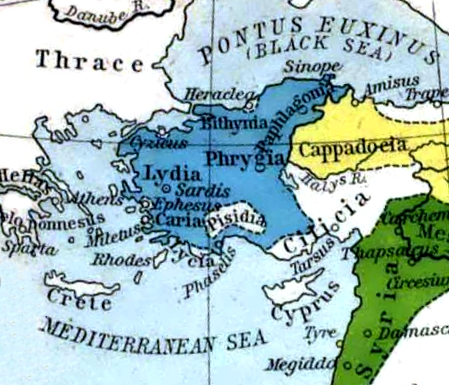Notes
Lydian Empire

Lydian Empire ca. 600 BCE
Achaeus
At the subsequent sitting of the Council, there were many proposals as to the proper punishment to inflict on Achaeus, and it was decided to lop off in the first place the unhappy prince’s extremities, and then, after cutting off his head and sewing it up in an ass’s skin, to impale his body. …
Thus did Achaeus perish, after taking every reasonable precaution and defeated only by the perfidy of those whom he had trusted, leaving two useful lessons to posterity, firstly to trust no one too easily, and secondly not to be boastful in the season of prosperity, but being men to be prepared for anything.
[For this kind of execution there are Near Eastern precedents, among them Bessus, the murderer of King Darius III, Arr. An. 4.7.3–4, with A. B. Bosworth, A Historical Commentary on Arrian’s History of Alexander, 2 (Oxford 1995), 44–45.]
Polybius (c. 200–118 BC),
The Histories. Volume III: Books 5-8. W. R. Paton, translator. Cambridge, Massachusetts: Harvard University Press, 2011. 8.21, p. 555.
Loeb Classical Library
Acheus
Or hanging like the captive Achaeus mayst thou die, who hung miserably by the stream that bears the gold.
[Note: A rebel against Antiochus the Great, who beheaded him, sewed him up in an ass’s skin and hung him on a cross at Sardis, by the “golden” river Pactolus (214 B.C.)]
Ovid (43 BC-AD 17/18),
Ibis. J. H. Mozley, translator. Cambridge, Massachusetts: Harvard University Press, 1929. 299, p. 257.
Loeb Classical Library
Œuvres ed. Esmangart
Ou plutôt Achaeus. Ce roi de Lydie, fut pendu sur les rives du Pactole, selon Ovide dans le poëme d’Ibis, pas ses sujets, qui s’étoient révoltés contre lui, parceqi’il avoit volu établie sur eux de nouveaux impôts. Rabelais auroit pu en effet ajouter bien d’autres personnages de l’antiquité, historiques ou fabuleux, qui s’étoient pendus, entre autres Antigone et Menon; mais les huit qu’il nomme sont plus que suffisants pour éclaircir sa pensée, et prouver que le pantagruélion est la corde qui a été substituée de son temps à la hart, pour pendre ceux à qui Dieu avoit refusé la grace de croire à l’infaillibilité du pape, et qui lui préféroient celle de l’Évangile.
Rabelais, François (1483?–1553),
Œuvres de Rabelais (Edition Variorum). Tome Cinquième. Charles Esmangart (1736–1793), editor. Paris: Chez Dalibon, 1823. p. 275.
Google Books
Acheus
Voy. Ovide, Ibis.
Rabelais, François (1483?–1553), Œuvres de F. Rabelais. Nouvelle edition augmentée de plusieurs extraits des chroniques admirables du puissant roi Gargantua… et accompagnée de notes explicatives…. L. Jacob (pseud. of Paul Lacroix) (1806–1884), editor. Paris: Charpentier, 1840. p. 308.
Achaeus
Ovid, Ibis 299.
Rabelais, François (1483?–1553),
The Five Books and Minor Writings. Volume 1: Books I-III. William Francis Smith (1842–1919), translator. London: Alexader P. Watt, 1893.
Internet Archive
Acheus
D’aprés Ovide, Ibis, 301, ses sujects l’aurient pendu, au bord du Pactole parce qu’il les accablait d’impôts. Il est difficile de dire si Rabelais a constitué lui-même cette liste de gens qui sont morts par pendaison ou s’il l’a trouvée tout faite dans les recueils d’esemples qui avaient cours de son temps. Voir Plattard, L’œuvre de Rabelais, p. 274.
Rabelais, François (1483?–1553),
Oeuvres. Édition critique. Tome Cinquieme: Tiers Livre. Abel Lefranc (1863-1952), editor. Paris: Librairie Ancienne Honoré Champion, 1931. p. 362.
Internet Archive
Achæus
Achæus, King of Lydia, strung up by his subjects for overtaxing them.
Rabelais, François (1483?–1553), Complete works of Rabelais. Jacques LeClercq (1891–1971), translator. New York: Modern Library, 1936.
Acheus
Ovide, Ibis, v. 301 (pendu par ses sujets qu’il accablait d’impôts).
Rabelais, François (1483?–1553), Œuvres complètes. Mireille Huchon, editor. Paris: Gallimard, 1994. p. 506, n. 18.
Lydia
Lydia was an Iron Age kingdom of western Asia Minor located generally east of ancient Ionia in the modern western Turkish provinces of Uşak, Manisa and inland İzmir. Its population spoke an Anatolian language known as Lydian. Its capital was Sardis.
The Kingdom of Lydia existed from about 1200 BC to 546 BC. At its greatest extent, during the 7th century BC, it covered all of western Anatolia. In 546 BC, it became a province of the Achaemenid Persian Empire, known as the satrapy of Lydia or Sparda in Old Persian. In 133 BC, it became part of the Roman province of Asia.
Achaeus
Achaeus (Ancient Greek: Ἀχαιός, Akhaios; died 213 BC) was a general and later a separatist ruler of part of the Greek Seleucid kingdom. He was the son of Andromachus, whose sister Laodice II married Seleucus Callinicus, the father of Antiochus III the Great. He accompanied Seleucus Ceraunus, the son of Callinicus, in his expedition across mount Taurus against Attalus I, and after the assassination of Seleucus Ceraunus revenged his death; and though he might easily have assumed the royal power, he remained faithful to the family of Seleucus.
In 223 BC Antiochus III, the successor of Seleucus Ceraunus, appointed him to the command of all Asia Minor on the western side of Mount Taurus. Achaeus recovered all the districts which Attalus had gained for the Seleucids once more; but being falsely accused by Hermeias, the minister to Antiochus, of intending to revolt, he did so in self-defence, assumed the title of king, and ruled over the whole of Asia on the western side of the Taurus. As long as Antiochus was engaged in the war with Ptolemy, he would not march against Achaeus; but upon the conclusion of a treaty with Ptolemy, he crossed the Taurus, uniting his forces with Attalus, and in one campaign deprived Achaeus of his dominions and took Sardis (with the exception of the citadel). After sustaining a siege of two years, the citadel at last fell into the hands of Antiochus in 213, through the treachery of Bolis (who had been employed by Sosibius, minister to Ptolemy). Bolis pledged to deliver Achaeus to safety, but turned him over to Antiochus, who immediately put him to death.
Polybius, 4.2.6, 4.48, 4.51.4, 5.40, 5.42, 5.57, 7.15–18, 8.17–23
